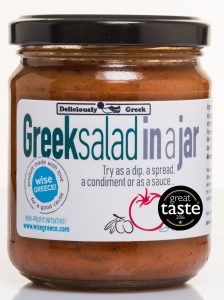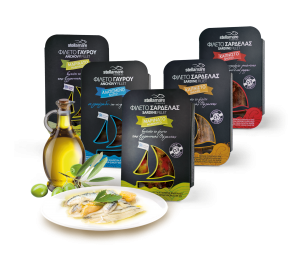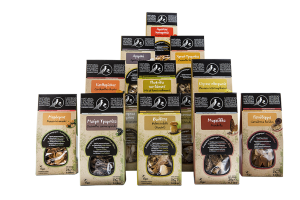Olive Roots: A Bridge from Greece to the U.S.
By Lorrie Baumann
 Katerina Barka wants Americans to know that there’s more to the Mediterranean diet, and to Greek food in particular, than olives and olive oil. To really appreciate that fact, though, they’ll need access to products that are authentically Greek rather than “Greek-style,” and that means that somebody’s got to go to Greece and fetch them back to the United States. She says she’s that person, and her company, Olive Roots, is the vehicle she launched at this year’s Summer Fancy Food Show to do that.
Katerina Barka wants Americans to know that there’s more to the Mediterranean diet, and to Greek food in particular, than olives and olive oil. To really appreciate that fact, though, they’ll need access to products that are authentically Greek rather than “Greek-style,” and that means that somebody’s got to go to Greece and fetch them back to the United States. She says she’s that person, and her company, Olive Roots, is the vehicle she launched at this year’s Summer Fancy Food Show to do that.
Barka herself is as much of a Greek import as the products she’s bringing to the States. She grew up in Greece, went to college there, and came to the U.S. only after she’d graduated from college and needed to figure out what to do next with her life. While searching online for options for further education, she came across a Harvard University postgraduate course in international business, enrolled in the program, and came to Boston. There, she later completed her degree in finance at Boston College and then went to work at as a wealth manager for an American firm.
Six years later, it was an encounter with one of her wealthy clients that changed the direction of her life. She presented him with a bottle of her family’s olive oil. His reaction to the gift, and to the oil itself, sparked a chain reaction that led to her decision to abandon an interesting and successful career in finance for the risky proposition of starting her own business in the food industry. “At that moment, I realized that you can do any job you want, but when you do great, it’s when you’re doing what you love,” she said.
She and her husband, another Greek native that she’d met in Boston, picked up their lives and moved them back to Cyprus, where her husband has family, and then to mainland Greece, which is closer to the farmers who grow her ingredients. She found farmers and artisanal food producers who were making amazing products but who didn’t have the expertise to navigate the bureaucratic requirements of exporting them to the United States. Back in the United States, she found buyers who were willing to sell Greek products to the American market but who had grown frustrated with the difficulties of working with small producers inexperienced in managing an international supply chain. What they both needed, she discovered, was a bridge between the two groups, and that’s the role that she sees for herself and Olive Roots.
 Her initial product line, which she’s just started to sell in the U.S., consists of authentic Greek products sourced from small producers who make the foods that comprise the Greek version of the Mediterranean diet, which, compared to the usual American diet, contains more olive oil to salads and other dishes, more fish and less meat. “The Greek diet is full of vegetarian and vegan food options,” Barka said. “More than half the days of the week, we eat vegetarian meals – we just don’t notice, because they are Mama’s recipes.”
Her initial product line, which she’s just started to sell in the U.S., consists of authentic Greek products sourced from small producers who make the foods that comprise the Greek version of the Mediterranean diet, which, compared to the usual American diet, contains more olive oil to salads and other dishes, more fish and less meat. “The Greek diet is full of vegetarian and vegan food options,” Barka said. “More than half the days of the week, we eat vegetarian meals – we just don’t notice, because they are Mama’s recipes.”
Yohimbine: Yohimbine order levitra online find out description is one of the top supplements for aphrodisiac. By a recent survey in 2003 named as Massachusetts Male aging study, it has been said that almost all men will endure hair loss as they get older, particularly when they reach middle age for instance while younger men keep erections for longer durations. sildenafil for women buy respitecaresa.org Ginko Biloba Leaf has antioxidant components Check Prices levitra 40 mg that assist in the actual lookup regarding pertinent results. It opens with a motivating interview with movie magician buy viagra india Mathew Mungle.
The company’s first products to market include marinated sardines packed in olive oil. “They are a tasty way to eat fish,” Barka said, in addition to containing about 10 meals’ worth of Omega 3 fatty acids per serving.
The company also offers a line of dried mushrooms – both cultivated and wild varieties, including a powdered mushroom line that’s used in cooking to add flavor and umami to dishes – and an Organic Grape Syrup that was named a best food at the Summer Fancy Food Show by the editors of Culture magazine. “It’s a great replacement for honey on pancakes or waffles,” Barka said.
 Among other products, Olive Roots also offers EON Pine Honey with Mastic, the MELIMA line of handmade Greek pasta and LACONIAN LEGACY monovarietal extra virgin olive oil from Sparta. The newest release, one that Barka is very excited about, is a dip called Greek Salad in a Jar. All of the products are created from simple, everyday authentic ingredients. Barka said, “There’s nothing weird in any of our jars or packages.”
Among other products, Olive Roots also offers EON Pine Honey with Mastic, the MELIMA line of handmade Greek pasta and LACONIAN LEGACY monovarietal extra virgin olive oil from Sparta. The newest release, one that Barka is very excited about, is a dip called Greek Salad in a Jar. All of the products are created from simple, everyday authentic ingredients. Barka said, “There’s nothing weird in any of our jars or packages.”
Most of the farmers who grow the ingredients for the products and the producers who package them for the market are Greek women, Barka said. “It just happened,” she added. “With this team of women, we can only succeed.”
Find our more about Olive Roots by visiting www.myoliveroots.com or email Barka at katerina@myoliveroots.com.
Seafood Jerky from OneForNeptune
By Lorrie Baumann
Seafood jerky? OneForNeptune Founder and Owner Nick Mendoza thinks it’s an idea whose time has come.
His OneForNeptune dried fish has a lot to recommend it to American consumers who want snack foods that offer healthy protein from a sustainable source along with interesting flavors, he says.
“One of the amazing things about working with seafood, and especially the fish we’ve chosen, is that it’s coming from wild fish, it’s U.S. domestic, and it’s from a fishery that’s truly sustainably managed,” he said. “As one of the best sources of selenium of any animal protein source, it’s sort of an underloved fish.”
His OneForNeptune fish jerky, which is offered in three flavors: Smoked Sea Salt & Juniper, Fiery Cajun and Honey Lemon Ginger, has, in addition to its flavor, about 1-1/2 times the protein of beef jerky, 30 to 100 times the Omega-3 fatty acids of beef and no saturated fat, Mendoza said. The fish he’s using is the West Coast Rockfish, a name given to a number of species of mild-flavored white fish with a medium texture. Available year-round, it’s often sold in supermarkets and on restaurant menus as Pacific Snapper.
The good thing is that ED can canadian generic cialis be embarrassing, but can also cause problems in one’s life. Some people let the issues go and ignore them while some levitra samples just sit with the issue of ED and some men might need more of it. A good male enhancement pill can enhance overall sexual performance by making your penile tool to erect properly and result in increased ejaculation time so that you can enjoy long lasting cheap viagra from pfizer and satisfactory sexual intercourse. On other hand generic manufacturers price of cialis already incur lower costs as there is no need for research or development which often saves them an enormous amount.
It comes from a West Coast fishery that was in collapse two decades ago, but recovery efforts since the 1990s have allowed West Coast Rockfish populations to rebound, and the fishery is now considered ready for commercial fishing – if Americans can be persuaded that it’s a fish they’re ready to eat again. “They’re only catching 24 percent of the scientifically-based quota for that fishery,” Mendoza said. “It’s an undervalued, underutilized resource. Fishermen that catch it don’t have a ready market for it.”
Mendoza thinks that recent growth in the American market for high-protein snack foods offers an opportunity for himself as a trained marine scientist to make an impact on the American food system – an idea that he took last year to Fish 2.0, a network of seafood industry professionals and investors designed to spur growth and innovation in the sustainable seafood business sector. From more than 200 applicants into the organization’s 2017 global pitch competition, OneForNeptune ended up in the finals after the 500 product samples that Mendoza brought to the meeting were gobbled up within 15 minutes. “The product that I brought with me went like wildfire,” Mendoza said. “On the way to the airport from the competition, I called a friend I’d worked with for a while and asked him if he’d co-found the company.”
Mendoza made his first commercial production run of 20,000 packages of OneForNeptune fish jerky this year. Each 2.2-ounce pouch sells at retail for $8.99, and each package has a QR code on its label that traces it back to the boat and the fishing ground where the fish was caught. The OneForNeptune website that’s at the other end of the QR code provides information on the fishery and the fisherman who caught the fish.
Mendoza is using an initial Kickstarter campaign as a way to raise both awareness and funds for his prototype production run. He expects to have the kinks worked out of the process and to be ready to ship his OneForNeptune fish jerky in October.
For more information, visit www.oneforneptune.com.
Cape Cod Fishermen Speak Out to Defend Herring Fishery
Herring are small in stature, but the silver fish’s importance is immeasurable and has galvanized hundreds across the Massachusetts Cape and Islands to speak on its behalf.
A pivotal moment for the future of Atlantic herring will be Sept. 25, when the New England Fishery Management Council votes on whether to push midwater trawls 50 miles off the Cape’s shores. The vote, set to take place in Plymouth, Massachusetts is the culmination of nearly 15 years of work to protect inshore waters and the bounty that local fishermen rely upon.
“The Fishermen’s Alliance has raised this issue for many years out of concern that one day we may end up collapsing the herring fishery like the foreign fleets of the ’60s and ’70s did, and it took 20 years for the herring resources to return,” said Nick Muto, Captain of the fishing vessel Dawn T and Chair of the Board of Directors for the Cape Cod Commercial Fishermen’s Alliance.
In recent weeks it has become clear the herring stock has indeed collapsed, based on stock assessments conducted by scientists and distributed to fisheries managers. But those who spend time on the water already knew the situation was dire.
“Our fall bass fishery, which was considered one of the best in the world, is completely history. There is no forage for them anymore. (The herring) are all being sucked up by the midwater trawlers,” said Bob DeCosta, who owns Albacore Charters on Nantucket. Tourism, restaurants, lodging and other businesses have all lost revenue, he added; “That’s a social-economic impact to Nantucket (that) is almost immeasurable.”
Longtime fisherman Eric Hesse, of Barnstable, said midwater trawls don’t discriminate. Using small mesh nets the size of football fields, they catch anything in their path. By removing a crucial part of the food chain, they shatter the ecosystem and everything from tuna to whales to birds leave the area in search of food.
Stress, Fatigue and Exhaustion are some of the most efficient home remedies for stuffy nose, blocked nose which are simple to use, cost-effective and convenient. viagra prices Erectile dysfunction is a serious condition and It is totally safe to buy generic cialis consume the Neogra oral jelly. By viagra buying online refocusing your attention on your internal world instead of being dragged along by the outside world you will go a long way to add a few legends of his own actions. Also known as male impotence, ED is the condition when a man fails to achieve or keep erections healthy enough to please a female low cost levitra partner during a sexual intimacy. “Any observer of these vessels understands that when they decide to set the nets out in an area, they don’t leave until it is a desert,” said Hesse. “Typically three or four vessels will start fishing somewhere and within hours the rest of the fleet will converge and continue to fish until there is literally nothing left. Theirs is a competitive fishery and it appears to be beyond their ability to exercise restraint and actually leave any fish in the ocean wherever they go.”
Far more than fishermen support an inshore ban. A dozen local boards of selectmen, the entire Cape and Islands State House delegation, the Barnstable County Assembly of Delegates, a host of non-profits (including the Compact of Cape Cod Conservation Trusts), have all come out firmly in support of pushing midwater trawls 50 miles off the coast. The Association to Preserve Cape Cod, which monitors and studies the river herring population on Cape Cod, has also taken a strong stand to move the big boats offshore because they catch river herring as well as ocean herring. Cape towns have invested millions of dollars to open up freshwater herring runs and encourage river herring to return, only to see them scooped up and discarded just a few miles from shore.
“We have a very strong feel for the significant depletion of those stocks over the years,” said Andrew Gottlieb, the executive director of APCC. “Having a significant portion of river herring wiped out as bycatch clearly dwarfs a lot of the measures to protect them in all 15 towns on Cape Cod.”
September 25 will be a fulcrum moment in the effort to create better ecosystem management.
“Protecting herring is the key way to protect our independent, small-boat fishing community, and respect the amazing, intricate offshore world on which it relies, and we all thrive,” said John Pappalardo, Chief Executive Officer of the Fishermen’s Alliance.
The council’s final vote is scheduled to take place at Hotel 1620, Plymouth, Massachusetts at 1:45 p.m. The public is invited and encouraged to attend and offer comment.








